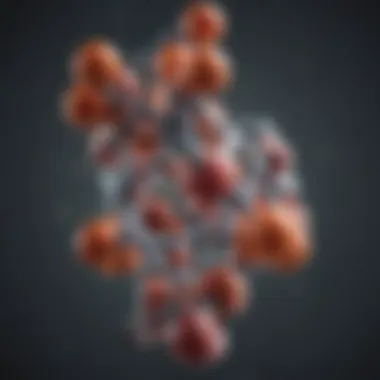Unveiling the Influence of Atkins Diet on Protein Consumption: A Comprehensive Analysis


Well-Being Overview
There is relentless intrigue surrounding the impact of the Atkins diet on protein consumption, a topic that demands meticulous examination due to its intricate associations. By delving deep into this relationship, we unravel a complex narrative that exposes the nuances of dietary choices and their effects on our well-being. It is crucial to understand the significance of this exploration, as it sheds light on the interplay between diet and health outcomes.
Mental Health Matters
In navigating the landscape of mental health, one must grasp the multifaceted nature of psychological well-being. Strategies aimed at enhancing mental wellness are essential components of self-care routines. Embracing coping mechanisms to mitigate stress and anxiety is imperative for fostering resilience in the face of life's challenges. By understanding how the Atkins diet impacts protein consumption, we can discern its implications for mental well-being.
Physical Wellness
Physical well-being is intricately linked to diet and exercise routines. Integrating sustainable and effective workout plans into our daily lives can yield profound benefits for our overall health. Adopting healthy eating habits that complement an active lifestyle is paramount in achieving physical wellness goals. Regular physical activity not only enhances our physical strength but also contributes to a sense of vitality and well-being.
Mindfulness & Self-Care Practices
In the realm of mindfulness and self-care, fostering a harmonious balance between work and relaxation is key to nurturing overall well-being. Exploring meditation, breathing exercises, and other mindfulness techniques can promote emotional equilibrium and mental clarity. Prioritizing self-care rituals that facilitate rejuvenation is pivotal in sustaining a holistic approach to well-being. By understanding the implications of the Atkins diet on protein consumption, we unveil potential adaptations to self-care practices.
Nutrition for Nourishment
Nutrition plays a pivotal role in nourishing our bodies and minds, underscoring the importance of a balanced diet rich in essential nutrients. Recommending nutrient-dense foods that support overall well-being is crucial for optimizing health outcomes. Experimenting with easy and healthy recipes can offer insight into the intersection of delicious cuisine and nutritional excellence. By delving into the impact of the Atkins diet on protein consumption, we gain a deeper understanding of how dietary choices shape our nourishment.
Introduction
In today's fast-paced world, the relationship between dietary choices and overall health has garnered significant attention. The Atkins Diet, known for its emphasis on low carbohydrate intake and high protein consumption, is a subject of intrigue for many individuals seeking to optimize their well-being. Understanding how the Atkins Diet impacts protein consumption is crucial for deciphering its potential implications on one's health and wellness. By delving into the intricate nuances of this dietary approach, we can unravel the synergies between protein intake and metabolic outcomes.
Overview of the Atkins Diet


The Atkins Diet, developed by Dr. Robert Atkins, is a weight-loss regimen that emphasizes reducing carbohydrate intake while promoting high protein and fat consumption. This dietary approach aims to shift the body's metabolism towards burning stored fat for fuel, leading to weight loss. By limiting carbohydrates, the Atkins Diet triggers a metabolic state known as ketosis, where the body utilizes ketones derived from fat breakdown for energy. This phase-based diet transitions individuals through different levels of carbohydrate restriction to achieve weight loss and metabolic benefits.
Importance of Protein in the Diet
Protein plays a pivotal role in various physiological functions within the body, making it an indispensable component of a balanced diet. From muscle repair and growth to enzyme production and immune function, protein is essential for sustaining health and vitality. In the context of the Atkins Diet, protein serves as a primary source of energy, especially during phases of carbohydrate restriction. By prioritizing protein consumption, individuals can support muscle integrity, enhance satiety, and regulate blood sugar levels effectively, thus optimizing their overall health.
Objective of the Article
The objective of this article is to explore the intricate interplay between the Atkins Diet and protein consumption, shedding light on how this dietary approach influences one's overall nutrient intake and metabolic responses. By examining the benefits, challenges, and misconceptions related to protein intake on the Atkins Diet, we aim to provide a comprehensive guide for individuals looking to optimize their dietary choices. Additionally, this article seeks to highlight strategies for optimizing protein consumption on the Atkins Diet, ensuring that readers can harness the full potential of this dietary approach for improved health and well-being.
Understanding the Atkins Diet
In this segment of the article focusing on the Atkins Diet's impact on protein consumption, it is crucial to delve deep into grasping the Atkins Diet concept. The Atkins Diet, a low-carb diet formulated by Dr. Robert Atkins, emphasizes reducing carbohydrate consumption to control insulin levels and promote weight loss. Understanding the Atkins Diet is fundamental as it not only outlines the dietary principles but also sheds light on its potential effects on protein intake.
Phases of the Atkins Diet
The Atkins Diet comprises four phases: Phase 1 (Induction), Phase 2 (Balancing), Phase 3 (Fine-Tuning), and Phase 4 (Maintenance). Each phase is strategically designed to transition the body into a state of ketosis, where it burns fat for fuel instead of carbohydrates. These phases play a critical role in regulating nutrient intake and controlling protein utilization throughout the dietary plan.
Role of Protein in the Atkins Diet
Protein plays a central role in the Atkins Diet by contributing to satiety, muscle maintenance, and metabolic functions. As the diet restricts carbohydrates, protein becomes essential for providing energy, repairing tissues, and supporting overall health. Understanding the significance of protein in the Atkins Diet is pivotal for maximizing its benefits and maintaining a balanced nutritional profile.
Effect of Carbohydrate Restriction on Protein Utilization
Carbohydrate restriction in the Atkins Diet alters the body's metabolism, leading to increased reliance on proteins for energy production. This shift affects protein utilization, emphasizing the importance of incorporating sufficient protein sources to meet daily energy requirements. Exploring how carbohydrate restriction influences protein utilization sheds light on the intricate dynamics of macronutrient metabolism within the context of the Atkins Diet.


Protein Requirements in Different Phases
Protein requirements vary across the different phases of the Atkins Diet based on activity levels, metabolic rates, and weight management goals. Understanding the changing protein needs during each phase is essential for optimizing performance, promoting muscle growth, and ensuring metabolic stability. Tailoring protein intake to specific Atkins Diet phases is key to achieving nutritional balance and maximizing the diet's effectiveness.
Benefits of Protein-Rich Foods in the Atkins Diet
Protein-rich foods play a pivotal role in the Atkins Diet, offering a myriad of benefits that go beyond mere sustenance. By delving into the realm of protein-rich foods in this article, we aim to shed light on their significance in enhancing overall health and wellness on the Atkins Diet. These foods are not merely sources of nourishment but act as catalysts for various physiological processes crucial for optimal functioning. The consumption of protein-rich foods is intricately linked to muscle building, repair, and maintenance, making them indispensable for individuals following the Atkins dietary protocol. In addition to supporting physical structure and function, proteins aid in weight management by promoting satiety and regulating appetite. This proactive approach to nutrition can have profound effects on metabolic health, influencing blood sugar regulation and overall well-being. We will dissect the various dimensions of protein-rich foods in the Atkins Diet to provide a comprehensive understanding of their role in promoting health and vitality.
Muscle Building and Repair
Proteins are the building blocks of muscles, essential for their growth, repair, and maintenance. Within the context of the Atkins Diet, adequate protein intake is crucial for facilitating muscle development and recovery. When individuals engage in physical activities or resistance training, protein-rich foods aid in the repair of muscle tissues damaged during exercise. This process not only supports muscle growth but also improves strength and endurance. By focusing on muscle building and repair within the Atkins framework, we can unravel how protein-rich foods contribute to the enhancement of physical performance and overall well-being.
Satiety and Weight Management
One of the key advantages of incorporating protein-rich foods into the Atkins Diet is their ability to promote feelings of fullness and satiety. Proteins have a high satiating effect, which can help individuals control their food intake and prevent excessive calorie consumption. By exploring the impact of protein-rich foods on satiety within the Atkins context, we can unravel how these foods contribute to effective weight management strategies. Understanding the interplay between protein consumption, satiety, and weight regulation is crucial for optimizing dietary practices and achieving sustainable progress towards health and fitness goals.
Metabolic Health and Blood Sugar Regulation
Apart from their role in muscle development and weight management, protein-rich foods play a vital role in maintaining metabolic health and regulating blood sugar levels. Proteins have a minimal impact on blood glucose compared to carbohydrates, making them an ideal choice for individuals with insulin resistance or diabetes. By examining how protein-rich foods influence metabolic health and blood sugar regulation in the context of the Atkins Diet, we can gain insights into their potential therapeutic benefits for individuals with metabolic disorders. This section will delve into the intricate mechanisms through which proteins impact metabolic pathways and contribute to overall glucose homeostasis.
Challenges and Misconceptions Related to Protein Intake on Atkins Diet
In the exploration of the impact of the Atkins Diet on protein consumption, it is paramount to delve into the challenges and misconceptions surrounding protein intake while following this particular dietary approach. Understanding these challenges is crucial for individuals looking to optimize their nutrition and overall well-being through the Atkins Diet.
When considering the Atkins Diet, one prevalent challenge revolves around the notion of a potential overemphasis on animal proteins. This emphasis raises concerns about the effects of excessive animal protein consumption on health outcomes. It is essential to carefully evaluate the sources of protein within the Atkins Diet to ensure a balanced approach that caters to individual nutritional needs. While protein plays a vital role in the diet, an excessive focus on animal-derived sources can lead to imbalances in other essential nutrients. This imbalance may impact overall health and negate the positive effects of the Atkins Diet.


Another significant area of concern related to protein intake on the Atkins Diet pertains to kidney health. There are apprehensions regarding the potential strain that high protein consumption, particularly from animal sources, might exert on kidney function. Individuals following the Atkins Diet need to be mindful of their protein choices to mitigate any adverse effects on renal health. Consulting with healthcare providers or nutrition professionals can offer personalized insights on maintaining kidney health while adhering to the Atkins Diet. By addressing these concerns proactively, individuals can navigate the intricacies of protein consumption on the diet while safeguarding their overall well-being.
Moreover, inadequate intake of essential micronutrients is a prevalent misconception associated with protein consumption on the Atkins Diet. While the diet emphasizes protein-rich foods, ensuring a diverse selection of nutrient-dense options is crucial to prevent micronutrient deficiencies. Focusing solely on protein intake may lead to neglecting other vital vitamins and minerals necessary for optimal health. By incorporating a variety of nutrient-rich foods and considering supplementation when needed, individuals can overcome this misconception and maintain a well-rounded nutritional profile while following the Atkins Diet. Understanding the significance of micronutrient balance alongside protein intake can enhance the effectiveness and sustainability of the dietary approach, promoting overall health and vitality.
In summary, addressing the challenges and misconceptions related to protein intake on the Atkins Diet is fundamental for optimizing nutritional outcomes and promoting long-term well-being. By acknowledging and proactively managing these aspects, individuals can harness the benefits of the diet while mitigating potential risks, thereby empowering themselves to make informed dietary choices that align with their health goals.
Optimizing Protein Consumption on the Atkins Diet
The section on Optimizing Protein Consumption on the Atkins Diet is a crucial aspect of this article as it delves into the intricate details of maximizing the benefits of protein intake within the framework of the Atkins diet. By focusing on this topic, readers can gain a deep understanding of how to tailor their protein consumption to align with the principles of the Atkins diet while optimizing their overall health and wellness. This section will explore key elements such as the significance of protein in the context of the Atkins diet, the specific benefits of optimizing protein consumption, and important considerations when structuring a protein-rich diet within the Atkins framework.
Diversifying Protein Sources
Diversifying protein sources is a fundamental strategy when following the Atkins diet to ensure a well-rounded intake of essential nutrients. By incorporating a variety of protein sources such as lean meats, poultry, fish, eggs, nuts, seeds, and dairy products, individuals can enhance the nutritional profile of their diet. This approach not only helps meet daily protein requirements but also provides a spectrum of amino acids vital for body functions. Diversification also minimizes the monotony of meals, making the dietary experience more enjoyable and sustainable in the long run.
Supplementing with Nutrient-Dense Foods
Supplementing with nutrient-dense foods is a valuable practice for individuals following the Atkins diet to bridge potential nutrient gaps. Including foods like leafy greens, colorful vegetables, fruits, and whole grains alongside protein sources can boost the overall nutrient content of meals. These foods are rich in vitamins, minerals, and antioxidants crucial for supporting various bodily functions and promoting overall health. By supplementing strategically, individuals can optimize their nutrient intake and support optimal well-being while following the Atkins diet.
Consulting with a Nutritionist
Consulting with a nutritionist is a wise step for individuals navigating the complexities of optimizing protein consumption on the Atkins diet. A qualified nutritionist can offer personalized guidance based on individual dietary needs, health goals, and lifestyle factors. They can help create a tailored meal plan that optimizes protein intake while ensuring nutrient adequacy. Moreover, nutritionists can address any concerns or challenges related to protein consumption, offering expert advice on balancing macros, selecting appropriate food choices, and optimizing nutritional intake. By consulting with a nutritionist, individuals can fine-tune their dietary approach and maximize the benefits of protein consumption within the Atkins diet.
Conclusion
The conclusion of this article serves as the culminating point in assessing the intricate relationship between the Atkins diet and protein consumption. This pivotal section encapsulates the key findings and insights garnered throughout the discourse. By delving deep into the impact of the Atkins diet on protein intake, readers can gain a profound understanding of how dietary choices can significantly influence overall health and well-being. The conclusion emphasizes the need for a balanced approach to protein consumption within the Atkins diet, highlighting the importance of considering individual health goals and nutritional requirements. Furthermore, it underscores the significance of continual research and evaluation in elucidating the long-term effects of high-protein diets on metabolic health and nutrient balance. Overall, the conclusion serves as a crucial reference point for readers looking to make informed decisions regarding their dietary habits and lifestyle choices.
Summarizing the Atkins Diet's Impact on Protein Consumption
Exploring the impact of the Atkins diet on protein consumption reveals a complex interplay between macronutrient intake and metabolic processes. Throughout the discussion, it becomes evident that the Atkins diet, characterized by its emphasis on high protein intake and low carbohydrate consumption, can elicit significant effects on protein utilization and overall nutritional adequacy. By scrutinizing the phases of the Atkins diet and the recommended protein requirements in each phase, individuals can tailor their dietary patterns to align with their health objectives. Moreover, analyzing the role of protein in muscle building, satiety regulation, and metabolic health sheds light on the multi-faceted impact of protein-rich foods within the Atkins diet. Understanding these dynamics is essential for maximizing the potential benefits of the Atkins diet while mitigating potential drawbacks associated with imbalanced macronutrient intake.
Future Implications and Research Directions
Anticipating the future implications of the Atkins diet on protein consumption necessitates a forward-thinking approach towards dietary guidelines and nutritional research. As the landscape of nutrition science continues to evolve, it is imperative to stay abreast of emerging trends and insights related to high-protein diets like the Atkins regimen. Future research directions may encompass exploring the effects of protein quality and diversity on long-term health outcomes, investigating the interaction between protein intake and microbiome composition, and delineating personalized dietary recommendations based on genetic predispositions. Additionally, evaluating the sustainability of high-protein diets in promoting holistic well-being and environmental conservation could pave the way for a more comprehensive understanding of dietary patterns in a global context. By highlighting these future implications and research directions, this article aims to spark curiosity and innovation in the field of nutrition, inspiring further exploration and discourse in optimizing dietary practices for enhanced health and vitality.



